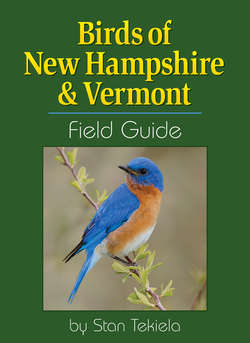Читать книгу Birds of New Hampshire & Vermont Field Guide - Stan Tekiela - Страница 27
На сайте Литреса книга снята с продажи.
ОглавлениеFish Crow
in flight
American Crow
Corvus brachyrhynchos
YEAR-ROUND
SUMMER
| Size: | 18" (45 cm) |
| Male: | All-black bird with black bill, legs and feet. Can have a purple sheen in direct sunlight. |
| Female: | same as male |
| Juvenile: | same as adult |
| Nest: | platform; female builds; 1 brood per year |
| Eggs: | 4-6; bluish to olive green with brown marks |
| Incubation: | 18 days; female incubates |
| Fledging: | 28-35 days; female and male feed young |
| Migration: | non-migrator to partial |
| Food: | fruit, insects, mammals, fish, carrion; will come to seed and suet feeders |
| Compare: | The Common Raven has a larger bill, shaggy throat feathers and a deep, raspy call. Raven has a wedge-shaped tail, apparent in flight; American Crow has a squared tail. Fish Crow (see inset) is strikingly similar, but the American is larger, has a shorter tail, larger head and bill, and a lower-pitched call. |
Stan’s Notes: A familiar bird. Often reuses its nest every year if not taken over by a Great Horned Owl. Collects and stores bright, shiny objects in the nest. Mimics other birds and human voices. One of the smartest of all birds and very social, often entertaining itself by provoking chases with other birds. Eats roadkill but rarely hit by vehicles. May live up to 20 years. Unmated birds, called helpers, help raise the young. Large extended families roost together at night, dispersing daily to hunt. American and Fish Crows are best distinguished by their remarkably different calls. The American gives a harsh “caw”; the Fish gives a nasal, high-pitched “cah.”
